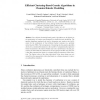Free Online Productivity Tools
i2Speak
i2Symbol
i2OCR
iTex2Img
iWeb2Print
iWeb2Shot
i2Type
iPdf2Split
iPdf2Merge
i2Bopomofo
i2Arabic
i2Style
i2Image
i2PDF
iLatex2Rtf
Sci2ools
114
click to vote
GECCO
2004
Springer
2004
Springer
Efficient Clustering-Based Genetic Algorithms in Chemical Kinetic Modelling
Two efficient clustering-based genetic algorithms are developed for the optimisation of reaction rate parameters in chemical kinetic modelling. The genetic algorithms employed are used to determine new reaction rate coefficients for the combustion of four different fuel/air mixtures in a perfectly stirred reactor (PSR). The incorporation of clustering into the genetic algorithm allows for a considerable reduction in the number of computationally expensive fitness evaluations to be realised without any loss in performance. At each generation, the individuals are clustered into several groups and then only the individual that represents the cluster is evaluated using the expensive fitness function. The fitness values of the other individuals in the same cluster are estimated from the representative individual based on a distance measure in a process called fitness imitation.
Related Content
| Added | 01 Jul 2010 |
| Updated | 01 Jul 2010 |
| Type | Conference |
| Year | 2004 |
| Where | GECCO |
| Authors | Lionel Elliott, Derek B. Ingham, Adrian G. Kyne, Nicolae S. Mera, Mohamed Pourkashanian, Sean Whittaker |
Comments (0)

